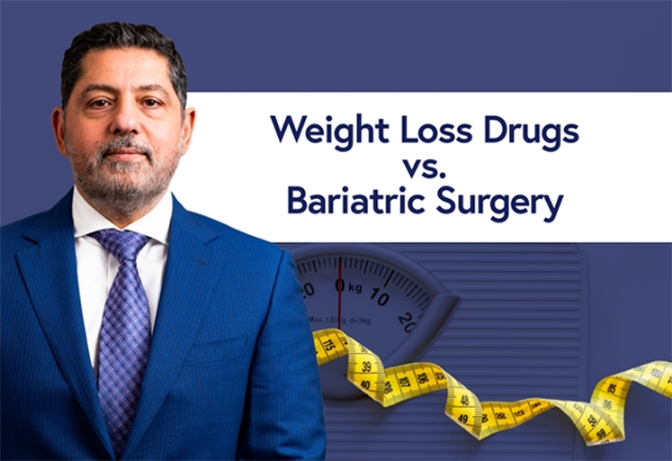Weight Loss Drugs vs. Bariatric Surgery – Which is Right For You?
If you’re trying to lose weight and finding it difficult, you may have considered taking medications or undergoing bariatric surgery. Both of these... read more
Call Us Today (732) 640-5316
E-Waiting RoomAs you lose weight, you may be able to reduce or eliminate the need for many of the medications you take for high blood pressure, heart disease, arthritis, cholesterol, and diabetes. If you have…Read More
Some insurance requires this type of letter from either your surgeon or primary care provider before final approval for surgery. Many will just accept your surgeon’s consultation summary note. It is best to ask…Read More
No and Yes.
Most people think of a “diet” as a plan that leaves you hungry. That is not…Read More
Yes there is a special pre-operative diet, usually 2 or 3 weeks just before surgery. The reason for the pre-operative diet is to shrink the liver and reduce fat in the abdomen. This helps…Read More
Complications are often reported under a separate medical billing code. The insurance company may not cover these costs. Appeal is often very helpful, and direct contact with your hospital can make a big difference…Read More
There are loan programs available to cover the cost of health expenses such as metabolic and bariatric surgery. Appeals to insurance companies or directly to your employer may reverse a denial of coverage. Metabolic…Read More
You will need to take a multivitamin for life. You may need higher doses of certain vitamins or minerals, especially Iron, Calcium, and Vitamin D. You will also need to have at least yearly…Read More
Some hair loss is common between 3 and 6 months following surgery. The reasons for this are not totally understood. Even if you take all recommended supplements, hair loss will be noticed until the…Read More
Most patients have some loose or sagging skin, but it is often more temporary than expected. You will have a lot of change between 6 and 18 months after surgery. Your individual appearance depends…Read More
Most women are much more fertile after surgery, even with moderate pre-op weight loss. Birth control pills do NOT work as well in heavy patients. Birth control pills are not very reliable during…Read More
Yes, but you may need medical clearance from your cardiologist. Bariatric surgery leads to improvement in most problems related to heart disease including:
During the screening process, be sure…Read More
It can. Be sure to follow any instructions from your surgeon about managing your diabetes around the time of surgery. Almost everyone with Type 2 Diabetes sees big improvement or even complete remission after surgery. Some studies have even reported improvement of Type 1 Diabetes after bariatric procedures….Read More
The general answer to this is yes. Make sure to tell your surgeon and anesthesiologist about all prior operations, especially those on your abdomen and pelvis. Many of us forget childhood operations. It is…Read More
Right away! You will take gentle, short walks even while you are in the hospital. The key is to start slow. Listen to your body and your surgeon. If you lift weights or do…Read More
After surgery, most patients return to work in one or two weeks. You may have low energy for a while after surgery and may need to have some half days, or work every other day for your first week back. Your surgeon will give you clear instructions. Most jobs want…Read More
You’re not alone! Being overweight can take a heavy toll on your life—did you know that weight-related health problems can take up to 15 years off your life expectancy? Ask yourself what is it that you live for. Seeing your kids grow up? Perhaps seeing your grand kids…Read More
The FDA has approved this system….Read More
The product is called the “da Vinci” after the much famed Italian Renaissance artist and mathematician. His at-the-time unparalleled anatomical accuracy and three-dimensionally detailed paintings brought his masterpieces to life. Similarly, the “da Vinci” Surgical System provides physicians with such enhanced detail and precision that the system can…Read More
Despite the name “robotic surgery” the system is not a self-automated robot, it is a robot-assisted system that relies entirely upon the surgeon.
Minimally Invasive Surgery or MIS is a surgery procedure typically performed through tiny incisions or operating ports, rather than large incisions. This type of surgery typically results in potentially shorter recovery times, fewer complications, reduced hospitalization costs and overall reduced trauma to the patient. MIS has become the…Read More
The major benefits surgeons whom utilize the “da Vinci” Surgical System encounter as opposed to traditional methods are greater surgical precision, increased range of motion, improved dexterity, enhanced visualization and improved access. The major benefits for patients may include a shorter hospital stay, less pain, less risk of…Read More
Those with severe, chronic esophageal reflux may need surgery to correct the problem if other medical treatments are not relieving their symptoms. When left untreated, chronic gastroesophageal reflux can cause further complications including esophagitis, esophageal ulcers, bleeding, or scarring of the esophagus.
Some patients do not respond well to medications or lifestyle changes while others are not comfortable following an on-going medication regimen. These patients, are candidates for a surgical procedure to correct their GERD symptoms. The most common surgical procedure for GERD is called a Nissen fundoplication, which involves…Read More
GERD, or Gastroesophageal reflux disease, is a digestive disorder that affects the muscular ring connecting the esophagus to the stomach, also known as the lower esophageal sphincter. Normally, the sphincter prevents food from creeping up into the esophagus from the stomach.
A patient diagnosed with GERD, presents…Read More
In children, most umbilical hernias will go away on their own by age 3 or 4. This is why it may be recommended to wait until your child has reached this age to consider surgical repair. If, however, the defect is greater than 2cm in diameter, it will…Read More
The abdominal organs are formed on the outside of a baby’s body during their development in the womb. These organs return to the abdominal cavity around the 10th week of gestation. If the wall of the abdomen fails to close around the abdominal organs, an umbilical hernia can…Read More
The most common symptoms associated with umbilical hernia are pain and a bulge. Usually symptoms are stable over time, but often the bulge can become larger or can involve entrapment of internal organs such as intestine. Anyone with a known umbilical hernia who develops persistent nausea and vomiting…Read More
An umbilical hernia is a protrusion, or abnormal bulge, that can be felt or seen over the belly button. This condition develops when a portion of the intestine protrudes through the muscle of the abdominal wall.
Umbilical hernias in children are caused by an opening in the…Read More
Femoral hernia repair has very few risks, however 1% of femoral hernia cases reported a return of their hernia after the operation. Complications of femoral hernia repair are extremely rare, however they can include the development of a lump under the incision site, difficulty passing urine, narrowing of…Read More
Femoral hernia repair can be performed one of two ways. It can be done through open surgery where one large cut is made in which the lump can be pushed back into the abdomen, or through laparoscopic surgery. This is a less invasive method where several small incisions…Read More
The operation pushes the bulge back into place and helps to strengthen the abdominal wall. Femoral hernia repair is a necessary procedure, since this type of hernia, if untreated, has a high risk of intestinal strangulation, which is a potentially life-threatening condition where a section of the intestine…Read More
A femoral hernia can occur when fatty tissue or part of an intestine, protrudes through into the groin area at the top of the inner thigh through a weak spot in the surrounding muscle wall of the abdomen and into the femoral canal.
Femoral hernias tend to…Read More
The procedure can be done in two different ways, either by a laparoscopic approach or by a conventional open repair. In a laparoscopic incisional herniorrhaphy, small incisions are made and a tube-like camera and instruments are used to place the mesh. In the conventional open repair procedure, the…Read More
The surgical repair of an incisional hernia is largely dependent on reducing or eliminating the tension present at the surgical site. The method that is preferred by most hernia surgeons is a tension-free method and is used by most medical centers. This procedure involves the placement of a…Read More
Pain is usually the first symptom a person will have with an incisional hernia, regardless of whether or not they have a bulge at the incision site or the abdomen. Once the bulge is present, it can increase in size and gradually cause more symptoms such as nausea…Read More
Conditions that increase strain on the abdominal wall such as obesity, pregnancy, peritoneal dialysis, liver disease, chronic straining/lifting, chronic cough, or chronic difficulties with bowel movements or urination are risk factors for hernia formation. Also smoking, advanced age, malnutrition, poor metabolism, steroid medications, chemotherapy, and hematoma or infection…Read More
An incisional hernia is one that forms in a previous incision from prior surgery. The incidence of a hernia forming in a previous abdominal scar is about 20%, and is even higher in people who are obese or who are active smokers. The hernia defect itself can form…Read More
For laparoscopic hernia repair, primary complications associated with the operation are not common. There is a low risk of injury to blood vessels, nerves, the bladder, the intestines, nerves or the spermatic cord leading into the testicle. Your individual risk for these complications be reviewed with your surgeon…Read More
There are two general options for inguinal hernia repair: the open approach and the laparoscopic approach. The open approach requires a three to five inch incision in the groin area. The hernia defect is identified and repaired using a piece of surgical mesh. Local anesthetic and sedation as…Read More
Everyone has natural weak point(s) in various areas of the abdominal wall due to their normal anatomy. One of these areas is in the groin (inguinal region). For children, hernia development can be congenital, but adults can develop this type of hernia as a result of strenuous activities,…Read More
Hernia repair meshes are generally similar to the material used to make mosquito nets. However, hernia meshes are highly developed materials engineered specifically for use as sterile medical devices used for abdominal wall reinforcement. Due to ongoing advances in technology, hernia meshes are an intense area of ongoing…Read More
If you suspect that you have an abdominal wall hernia, and it is causing you pain or discomfort, you should see your primary doctor for an exam and confirmation of the hernia. You can then request a referral to a hernia repair specialist, such as the surgeons at…Read More
Abdominal wall hernias are treated with surgical repair, and depending on the size of the defect opening and other factors associated with your individual medical profile are often repaired with hernia mesh. These procedures are done either through an open incision or laparoscopically (through small incisions) depending on…Read More
Abdominal wall hernias are sometimes diagnosed by the patient who feels a bulge and is sometimes associated with pain. If this is the case, the hernia needs to be confirmed by a physician exam. Hernias can also be diagnosed on imaging studies such as CT scan. If you…Read More
Usually pain associated with a bulge are the first signs of an abdominal wall hernia. These can occur in the groin, at the bellybutton, or through a prior incision site from surgery, even years after the scar has healed.
A weakness in the layers of the abdominal wall is what is responsible for the formation of a hernia. This can be a natural weakness, for example those that commonly occur in the groin or belly button, or can develop at a weak point in a healed incision…Read More
An abdominal wall hernia is a defect, or abnormal opening, in the muscle or connective tissue layers that make up the abdominal wall. The abdominal wall is what keeps your internal organs inside and protected from the outside world. The abdominal wall extends from the bottom of the…Read More
Patients who suffer the following conditions along with a hiatal hernia may be required to undergo surgical repair:
It is not uncommon for people to have no symptoms associated with their hiatal hernia. When symptoms do occur, they normally consist of heartburn and gastroesophageal reflux. Other symptoms may include pain or discomfort in the stomach or upper abdomen, chest pain, a harsh or sour taste in…Read More
The diaphragm is a sheet of muscle that separates the abdomen from the chest cavity. It has an opening in the middle called the hiatus. The food pipe, or esophagus, runs through the hiatus in order for it to enter into the stomach. When the hiatus is enlarged,…Read More
If the hiatal hernia is in danger of becoming constricted or strangulated (so that the blood supply is cut off), surgery may be needed to reduce the hernia, meaning put it back where it belongs.
Hernia surgery is not necessary when patients do not have any symptoms associated with their hiatal hernia. Although some mild symptoms such as bloating or stomach displeasure, and heartburn can occur, there are ways a hiatal hernia may be treated through healthy lifestyle changes, including:
A hiatal hernia can be diagnosed with a specialized X-ray (using a barium swallow) that allows a doctor to see the esophagus or with an endoscopy. Other ways to diagnose a hiatal hernia are by CT scan or esophagoscopy (EGD). The esophagoscopy is a procedure where an endoscope,…Read More
Hiatal hernias occur more often in women, people who are overweight, and people older than 50.
A hiatal hernia can be caused by a variety of factors. However, the cause is unknown for the majority of patients. Some people may be born with a short esophagus or a large hiatus, or they may develop these conditions over time owing to weakened tissue or chronic…Read More
Through the early trials of the endoscopic sleeve gastroplasty and published medical articles, the procedure has proven to yield great results for patients. A study published in the medical journal “Endoscopy” can be seen here. The initial findings show patients may expect to lose over 30% of their…Read More
The endoscopic sleeve gastroplasty procedure is specifically designed with patients in mind whom are not morbidly obese, do not qualify for bariatric surgery, or whom are unable to undergo bariatric surgery. This is may include those with a body mass index of less than 40 with no comorbidities,…Read More
The endoscopic sleeve gastroplasty is a new, minimally invasive non-surgical procedure. It is a weight loss procedure offered to patients whom are not qualified candidates for bariatric surgery. The entire procedure is done through the mouth so there is no need for any incisions and as a result…Read More
Depending on the patient’s insurance plan, the procedure will be covered. If the plan does not qualify, there are cash pay options available. Further information can be provided upon request at your next appointment with Dr. Sadek.
At the conclusion of the procedure, patients usually return to their normal routine within 48 hours. It is important that patients follow the same diet and exercise regime from their original weight loss surgery after the finish of the outlet and pouch repair.
As a result of the endoscopic procedure, patients typically feel little or no discomfort with minor side effects such as gas pain, nausea, sore throat, swollen tongue, and lip pain from the oral insertion of the endoscope.*
At times open or laparoscopic revision surgery can be very difficult and even impossible due to scarring and adhesions from the original Weight Loss Surgery procedure. During the longer abdominal revision surgery, patients are three times more likely to develop complications during this than original WLS. In comparison…Read More
According to numerous studies, the majority of patients that undergo Weight Loss Surgery regain a significant amount of weight after the procedure. One common cause of this is the gradual stretching of the stomach or pouch outlet. Experts have proven that once the stomach and pouch begin to…Read More

Dr. Ragui Sadek is a premier surgeon who established a state-of-the-art and one of the safest bariatric surgery programs in the state. Dr. Sadek has fellowship training in both laparoscopic/bariatric surgery and surgical trauma/critical care, allowing him to safely perform complex surgeries on patients who have been turned down by other practices. As a Clinical Assistant Professor of surgery at RWJ Medical School & the Director of bariatric surgery program at RWJ University Hospital, Dr. Sadek offers a cutting-edge range of laparoscopic, robotic, & bariatric surgical procedures with a complication rate substantially below the national average.
Dr. Sadek is a Clinical Assistant Professor of Surgery at Rutgers-Robert Wood Johnson Medical School and a Fellow of the American College of Surgeons. Having performed more than three thousand advanced surgical procedures, Dr. Sadek has established a strong patient satisfaction rate and a solid reputation among the surgical community and is renowned as a top physician in his field by International Association of Healthcare Professionals. As a board-certified surgeon, he holds affiliations with the American Society of Metabolic and Bariatric Surgery and the Society of American Gastro Endoscopic Surgeons. More about Dr. Sadek
Stay current with Advanced Surgical & Bariatrics of New Jersey

If you’re trying to lose weight and finding it difficult, you may have considered taking medications or undergoing bariatric surgery. Both of these... read more

Are you frustrated with your inability to lose weight? Tired of being trapped in an endless cycle of yo-yo dieting, over-exercising, cleanses, and... read more